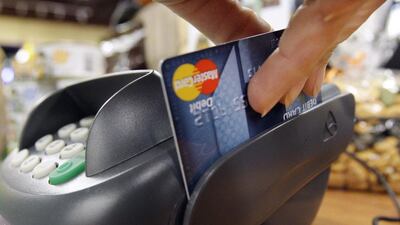Debt is the very definition of a double-edged sword. Used correctly, it can be a good weapon in your financial arsenal to put you on the fast track to savings and investments that secure you or your family's future. Rely on debt too much, and it can dish out a lot of damage. Getting this balance right is one of the trickier financial issues people wrestle with. Here Jamal Alvi, the chief credit officer for Abu Dhabi Islamic Bank's Retail Banking Group and a member of The National's The Debt Panel - a weekly online column to help readers tackle their liabilities more effectively - outlines how to ditch the debt for good:
Good or bad
First, it’s important to distinguish between ‘good’ and ‘bad’ debt. Debt isn’t necessarily to be avoided at all costs – in fact, if you’re relatively debt-free and borrowing to finance a purchase that’s likely to increase in value or pay other dividends, it can be a very sound idea. Examples would include securing finance to invest in a new home or higher education.
Debt can also be good if it is used to consolidate other debts to enable lower payments, by saving on financing costs and helping to reduce the overall debt. The trouble starts when debt is used to finance “indulgence” purchases, like a holiday or new pair of shoes – or worse, used to plug holes in the monthly budget - in other words, when expenses are consistently greater than income.
This is the classic, and often vicious, cycle – you spend more than you earn, so you borrow to fill the gap; more of your spending has to go to repaying debts so you keep borrowing to maintain your lifestyle, and soon enough you’re taking on more debt just to keep up with the monthly payments.
Adjust your spending
Needless to say, the best way out of the debt cycle is to avoid it in the first place. Try to spend less than what you earn, and before taking on debt of any kind make sure you’re aware of all fees and charges and prepared to make the monthly payments – even if your financial circumstances change. In general no more than a third of your income should go to debt payments.
The escape plan
But of course, sometimes even the best financial planners find themselves caught in a debt trap. The good news is with a certain amount of discipline and strategy, escape is always a possibility. Your top priority should be to avoid taking on any more debt – that way at least the problem won’t get worse, and any progress you make will be clear. Next, try to rank your debts in terms of their size and monthly payments, and crucially, the cost of each debt. Debts with the highest rates – typically credit card debts – should always be tackled first since they’re they most expensive over time.
First priority
Pick the top debt on the list and throw everything you’ve got at it, even if it’s just a bit over the minimum payment each month. A monthly budget can help you cut expenses and divert more money to debt payments, and of course any extra cash, such as bonuses, should go towards them as well. Once you’ve paid off that debt - congratulations - move on to the one with the next highest cost. You’ll be in the clear before you know it.
Approach the bank
If you’re struggling even to meet your monthly payments, it might be time to talk to your bank. A good financial provider is always there to help, and working out a sustainable solution to your debt issues is in the best interests of both sides. You may be offered a restructuring plan with lower payment rates and a longer tenure, or a consolidation programme that helps you to pay down your debt with a single (often smaller) monthly payment.
In short, a few simple rules will help you manage your debts - make sure you can comfortably afford the payments before taking any new debts on, preferably use debt only on things that increase in value, and make sure you know the rate of the proposed debt and all the associated charges before signing on the dotted line.
• Do you need help solving a debt issue? Write to The Debt Panel at pf@thenational.ae
pf@thenational.ae

